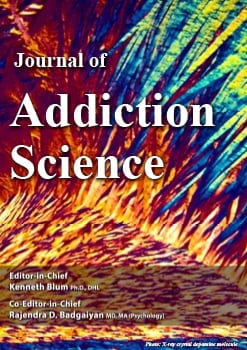Excerpts:
We hypothesize that the reduction in shyness and improvement in self-control [following 3 weeks of abstinence] are potentially due to both neurological and psychological factors. The energizing effects may have been generated mainly by improved functionality of reward structures through reduced stimulation. …
A shameful attitude towards one’s masturbation practice can have a negative impact on mental health. However, most of our participants reported little to no shame. …
Three weeks may be too short a period to reveal the full benefits of [abstinence].
Journal of Addiction Science
Jochen Straub and Casper Schmidt, J Addict Sci 8(1): 1-9. May 9, 2022
ABSTRACT
Many young men have noticed significant personal benefits from abstaining from online pornography and masturbation which has resulted in a large online movement. This study is a step toward quantitatively exploring these benefits in 21 single men who underwent three weeks of pornography and masturbation abstinence. When comparing the abstinence group to a control group, we found significantly strong effects of reduced mental and physiological fatigue. Furthermore, medium effects were discovered in measures of increased wakefulness, activity, inspiration, self-control, and reduced shyness. Participants who additionally abstained from sex showed even stronger effects in reduced mental and physiological fatigue. The effects found suggest energizing and performance-enhancing potentials in a non-clinical group of single male subjects. These findings could be relevant to the treatment of a range of clinical symptoms including social anxiety, lethargy, and fatigue. A limited period of sexual abstinence might also increase personal, athletic, and professional performance.
Comments by a neuroscientist
While the authors were cautious about causation, I see a parallel with alcoholism. One can argue that “alcoholism does not cause anhedonia (inability to feel pleasure). Instead, people with pre-existing anhedonia are more prone to become alcoholics.” While this may certainly be true for some, the fact is that normal people develop acquired anhedonia through prolonged alcoholism.
I think porn’s effects are similar. Normal people (and brains) will develop what we could call acquired RDS [which entails reduced sensitivity to dopamine] through porn use. In fact, I remember scientists arguing over causation in relation to the Max Planck study by Simone Kuhn. Some argued that perhaps the lower gray matter volume in the caudate of the striatum (part of the reward system) could encourage porn users to use more porn.
However, Kuhn clearly stated she favored causation going in the other direction. She explained that, in effect, “porn might wear down the reward system”, making it less responsive – thus increasing desire for more stimulation.
The same logic can be applied here. It is known as the “within system opponent process theory”. That is, for every biological process, A must follow B with an effect of the opposite nature. This helps maintain homeostasis.
For example, people bungee jump in order to experience the intense euphoria that follows their initial panic. Similarly, today’s porn is super-excitatory for the brain. Afterward, however the user typically feels sleepier during the day and experiences reduced ability for prolonged concentration.
This is precisely what opponent-process theory would predict: over excite the brain repeatedly and the brain will then actually slow down and inhibit itself. This explains post-porn sluggishness.
Over-users enter a spiral in which over stimulation of the brain then slows the brain down for a time. The sluggish brain then tries to “fix” itself by urging its owner to consume more stimulating material. It is a vicious cycle.

